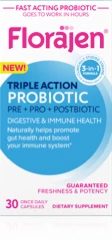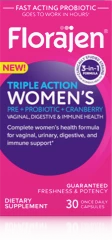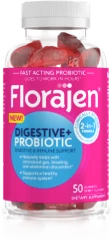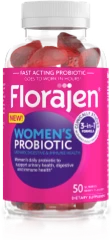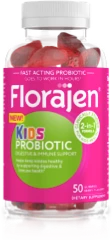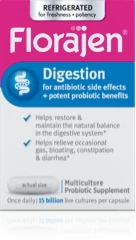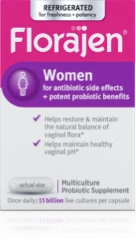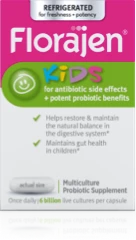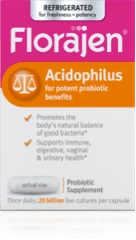Could Probiotics Become Our Next Weapon Against the Flu?
Usually, when we talk about the human microbiome and bolstering it with probiotics, we’re talking about the beneficial bacteria that coexist in our digestive system. But, actually, our personal bacteria populations are nearly everywhere in and on our bodies. Even in our respiratory system — including our nasal passages, throat and lungs.
Recently, researchers at the University of Michigan in Ann Arbor set out to see if differences in a person’s respiratory microbiome could be related to his or her susceptibility to catching the flu.
We’re in the midst of a serious flu season, so this seems particularly timely. Indeed, WebMD reports that the 2019/2020 flu season is on track to be one of the worst in decades. CDC statistics indicate that 2,900 people have already died from the flu this winter and we’ve still got weeks of potential illness to go.
According to the scientists from the University of Michigan, who published their work in the journal PLOS ONE, individuals with a certain type of bacterial community in their respiratory tracts seem to be less likely to get the flu. And, this mixture of bacteria is more common in adults than in children — which may help explain why the flu can be more common and severe in children.
Finding this potential link between the respiratory microbiome and the flu may mean that (someday) specific probiotics could be developed as a way to help prevent flu. We’re not there yet, of course. So, in the meantime, remember to stick to tried and true flu season recommendations:
- Get your flu shot.
- Wash your hands often.
- Cough or sneeze into your elbow.
- Repeat.
If you get the flu or a cold that transitions into a more serious condition requiring antibiotic treatment, remember that a probiotic like Florajen Digestion can help ease unpleasant side effects like antibiotic-associated diarrhea and other digestive upset. According to research in the Journal of the American Medical Association, people taking antibiotics concomitantly with probiotics are 42% less likely to develop diarrhea.
For best results, take Florajen at least 1 to 2 hours before or after your antibiotic prescription – this timing will help both your antibiotic and your probiotic have maximum efficacy without affecting one another.
If possible, continue taking your probiotic daily for at least two weeks after your course of antibiotics is completed. This can help combat any lasting effects on your gut from the antibiotics and allow your microflora to bounce back.
You may also consider adding a probiotic to your daily wellness regimen for help with digestion, women’s health, and general or children’s well-being. Harvard Medical School reports that probiotics are generally considered safe and to have no side effects. If there are side effects, they’re usually very mild (like a little more gas than usual) and should cease after a couple weeks of consistent use. For most people in good health, WebMD says probiotics won’t cause any issues; however, people who have an immune deficiency, are critically ill, recently had surgery, or are being treated for cancer should consult their doctor before using probiotics. Also be sure to talk to a pediatrician before giving probiotics to your baby, especially if he or she is sick. Florajen Kids, for example, is recommended for children over 6 months of age.
Looking for Florajen? We keep our probiotics refrigerated for freshness and potency. Just ask for them, no prescription necessary, at the pharmacy counter!
*These statements have not been evaluated by the Food and Drug Administration. These products are not intended to diagnose, treat, cure or prevent any disease.
REFERENCES:
- Segers ME, Lebeer S. Towards a better understanding of Lactobacillus rhamnosus GG - host interactions. Microbial Cell Factories. 2014;13(Suppl 1):S7. doi:10.1186/1475-2859-13-S1-S7. [LINK https://www.ncbi.nlm.nih.gov/pmc/articles/PMC4155824/ ]
- Sugahara H, et al. Probiotic Bifidobacterium longum alters gut luminal metabolism through modification of the gut microbial community. Scientific Reports 5, Article number: 13548 (2015) [LINK http://www.nature.com/articles/srep13548 ]
- Kirjavaninen et al. Aberrant composition of gut microbiota of allergic infants. FEMS Immunol Med Microbiol. 2001;32;1. https://www.ncbi.nlm.nih.gov/pmc/articles/PMC1773282/
Bjorksten et al. The intestinal microflora in allergic Estonian and Swedish infants. Clin Exp Allergy. 1999;29:342. - McFarland LV. Epidemiology, risk factors and treatments for antibiotic-associated diarrhea. Dig Dis. 1998;16(5):292-307
https://www.ncbi.nlm.nih.gov/pubmed/9892789 - Waigankar SS, Patel V. Role of probiotics in urogenital healthcare. Journal of Mid-Life Health. 2011;2(1):5-10. doi:10.4103/0976-7800.83253.
https://www.ncbi.nlm.nih.gov/pmc/articles/PMC3156505/
and
Vásquez A, Jakobsson T, Ahrné S, Forsum U, Molin G. Vaginal Lactobacillus Flora of Healthy Swedish Women. Journal of Clinical Microbiology. 2002;40(8):2746-2749. doi:10.1128/JCM.40.8.2746-2749.2002.
https://www.ncbi.nlm.nih.gov/pmc/articles/PMC120688/ - Wright JJ, Paauw DP. Complications of Antibiotic Therapy. Medical Clinics of North America; July 2013, 97(4): 667–679.
http://www.medical.theclinics.com/article/S0025-7125(13)00029-1/abstract - Vanderhoof J.A., et al . Lactobacillus GG in the prevention of antibiotic-associated diarrhea in children. J Pediatr. 1999;135(5):564-568.
https://www.ncbi.nlm.nih.gov/pubmed/10547243 - “ A.G. Mohamed, Hayam M. Abbas, Abeer F. Zayan and Nayra Sh. Mehanna, 2016. Bacterial Strains as Vitamins Supplements to Prepare Functional Dairy Beverages. American Journal of Food Technology, 11: 234-239. https://scialert.net/fulltextmobile/?doi=ajft.2016.234.239
- Probiotics, What’s the Bottom Line. National Center for Complementary and Integrative Health, National Institutes of Health website. Accessed April 2, 2017 https://www.nccih.nih.gov/health/probiotics-what-you-need-to-know
- Kim SE, et al. Change of Fecal Flora and Effectiveness of the Short-term VSL#3 Probiotic Treatment in Patients With Functional Constipation. Constipation Research group of Korean Society of Neurogastroenterology and Motility. J Neurogastroenterol Motil. 2015 Jan 1;21(1):111-20. doi: 10.5056/jnm14048. https://www.ncbi.nlm.nih.gov/pubmed/25537674
- Probiotics May Ease Constipation. Harvard Health Publications, Harvard Medical School website. Accessed April 4, 2017 http://www.health.harvard.edu/blog/probiotics-may-ease-constipation-201408217377
- Dimidi E, et al. The effect of probiotics on functional constipation in adults: a systematic review and meta-analysis of randomized controlled trials. The American Journal of Clinical Nutrition. August 6, 2014, doi:3945/ajcn.114.089151 https://ajcn.nutrition.org/article/S0002-9165(23)04789-5/fulltext
- Khalif IL, et al. Alterations in the colonic flora and intestinal permeability and evidence of immune activation in chronic constipation. Dig Liver Dis. 2005 Nov; 37(11):838-49. https://www.ncbi.nlm.nih.gov/pubmed/16169298
and
Barbara G, et al. Interactions between commensal bacteria and gut sensorimotor function in health and disease. Am J Gastroenterol.2005 Nov;100(11):2560-8. https://www.ncbi.nlm.nih.gov/pubmed/16279914 - Miller LE, Ouwehand AC. Probiotic supplementation decreases intestinal transit time: meta-analysis of randomized controlled trials. World J Gastroenterol. 2013 Aug 7; 19(29):4718-25. https://www.ncbi.nlm.nih.gov/pubmed/23922468
- Cha BK, et al. The effect of a multispecies probiotic mixture on the symptoms and fecal microbiota in diarrhea-dominant irritable bowel syndrome: a randomized, double-blind, placebo-controlled trial. J Clin Gastroenterol. 2012;46:220–227. doi: 10.1097/MCG.0b013e31823712b1.
and
Whorwell PJ, Altringer L, Morel J, et al. Efficacy of an encapsulated probiotic Bifidobacterium infantis 35624 in women with irritable bowel syndrome. Am J Gastroenterol. 2006;101:1581–1590. doi: 10.1111/j.1572-0241.2006.00734.x. - MedlinePlus, U.S. National Library of Medicine website. Accessed April 4, 2017 https://medlineplus.gov/diarrhea.html
- Using Probiotics for Diarrhea. WebMD website. Accessed April 4, 2017 http://www.webmd.com/digestive-disorders/probiotics-diarrhea#1
-
McFarland LV. Meta-analysis of probiotics for the prevention of traveler's diarrhea. Travel Med Infect Dis. 2007 Mar;5(2):97-105.
https://www.ncbi.nlm.nih.gov/pubmed/17298915
and
Traveler’s Diarrhea. Centers for Disease Control and Prevention website. Accessed March 31, 2017. https://wwwnc.cdc.gov/travel/yellowbook/2016/the-pre-travel-consultation/travelers-diarrhea - How to Prevent Diarrhea While You Take Antibiotics. Cleveland Clinic website. Accessed April 4, 2017 https://health.clevelandclinic.org/how-to-prevent-diarrhea-while-you-take-antibiotics
- Infectious diarrhea: Can probiotics help against diarrhea? PubMed Health, U.S. National Library of Medicine website. Accessed April 4, 2017. https://www.ncbi.nlm.nih.gov/pubmedhealth/PMH0088733/
- Based on market survey conducted by American Lifeline December 2016.
- Could Probiotics Help Alleviate your Functional Gastrointestinal Symptoms? International Foundation for Functional Gastrointestional Disorders website. Accessed April 4, 2017. https://www.iffgd.org/diet-treatments/could-probiotics-help-your-symptoms.html
- Kim HJ, et al. A randomized controlled trial of a probiotic, VSL#3, on gut transit and symptoms in diarrhoea-predominant irritable bowel syndrome. Aliment Pharmacol Ther (2003)17: 895–904. https://www.ncbi.nlm.nih.gov/pubmed/12656692
- Kim HJ, et al. A randomized controlled trial of a probiotic combination VSL# 3 and placebo in irritable bowel syndrome with bloating. Neurogastroenterol Motil (2005)17: 687–696. https://www.ncbi.nlm.nih.gov/pubmed/16185307
- Supplements for IBS: What Works? WebMD website. Accessed April 4, 2017 http://www.webmd.com/ibs/features/supplements-for-ibs-what-works#1
- Bloating 101: Why You Feel Bloated. WebMD website. Accessed April 4, 2017 http://www.webmd.com/digestive-disorders/diarrhea-10/bloated-bloating
- Health benefits of taking probiotics. Harvard Health Publications, Harvard Medical School website. Accessed March 31, 2017. http://www.health.harvard.edu/vitamins-and-supplements/health-benefits-of-taking-probiotics
- Survey of full-time U.S. pharmacists who stock Florajen, by DMD Healthcare Research, December 2015.
- Jiang, W., Ni, B., Liu, Z. et al. The Role of Probiotics in the Prevention and Treatment of Atopic Dermatitis in Children: An Updated Systematic Review and Meta-Analysis of Randomized Controlled Trials. Pediatr Drugs 22, 535–549 (2020). https://doi.org/10.1007/s40272-020-00410-6
- Tan‐Lim, CSC, Esteban‐Ipac, NAR, Mantaring, JBV, et al. Comparative effectiveness of probiotic strains for the treatment of pediatric atopic dermatitis: A systematic review and network meta‐analysis. Pediatr Allergy Immunol. 2021; 32: 124– 136. https://doi.org/10.1111/pai.13305
- M. Alexander Otto. “Yeast Infection Four Times as Likely with Penicillin Use.” Clinician Reviews, 13 Dec. 2016, https://www.mdedge.com/clinicianreviews/article/77427/infectious-diseases/yeast-infection-four-times-likely-penicillin-use?sso=true.
- Navarro-López V, Ramírez-Boscá A, Ramón-Vidal D, et al. Effect of Oral Administration of a Mixture of Probiotic Strains on SCORAD Index and Use of Topical Steroids in Young Patients With Moderate Atopic Dermatitis: A Randomized Clinical Trial. JAMA Dermatol. 2018;154(1):37–43. doi:10.1001/jamadermatol.2017.3647
- Yan F, Polk DB. Probiotics and immune health. Curr Opin Gastroenterol. 2011 Oct;27(6):496-501. doi: 10.1097/MOG.0b013e32834baa4d. PMID: 21897224; PMCID: PMC4006993. https://pubmed.ncbi.nlm.nih.gov/21897224/
- Hanifin JM, Reed ML; Eczema Prevalence and Impact Working Group. A population-based survey of eczema prevalence in the United States. Dermatitis. 2007 Jun;18(2):82-91. doi: 10.2310/6620.2007.06034. PMID: 17498413.
- Eczema Prevalence, Quality of Life and Economic Impact.” National Eczema Association, 16 Mar. 2021, https://nationaleczema.org/research/eczema-facts/.
- Elizabeth Campbell and Allen Sayler. “Medical Foods – Insights Into FDA's Interpretation and Enforcement.” Food Safety RSS, Food Safety, 6 Mar. 2018, https://www.food-safety.com/articles/5701-medical-foods-insighte28099s-into-fdae28099s-interpretation-and-enforcement.
- Simpson EL, Guttman-Yassky E, Margolis DJ, et al. Association of Inadequately Controlled Disease and Disease Severity With Patient-Reported Disease Burden in Adults With Atopic Dermatitis. JAMA Dermatol. 2018;154(8):903-912.
- Wei W, Anderson P, Gadkari A, et al. Extent and consequences of inadequate disease control among adults with a history of moderate to severe atopic dermatitis. J Dermatol. 2018;45(2):150-157.
- Study finds 1,000 species of bacteria on healthy human. Los Angeles Times website. https://www.latimes.com/archives/la-xpm-2009-may-29-sci-skin-bacteria29-story.html. Accessed April 13, 2021.
- Segers ME, Lebeer S. Towards a better understanding of Lactobacillus rhamnosus GG – host interactions. Microbial Cell Factories. 2014;13(Suppl 1):S7. doi:10.1186/1475-2859-13-S1-S7. https://www.ncbi.nlm.nih.gov/pmc/articles/PMC4155824/.
- Hill D, Sugrue I, Tobin C, Hill C, Stanton C, Ross RP. The Lactobacillus casei Group: History and Health Related Applications. Front Microbiol. 2018;9:2107. Published 2018 Sep 10. doi:10.3389/fmicb.2018.02107
- Chyn Boon Wong, Toshitaka Odamaki, Jin-zhong Xiao, Beneficial effects of Bifidobacterium longum subsp. longum BB536 on human health: Modulation of gut microbiome as the principal action, Journal of Functional Foods, Volume 54, 2019, Pages 506-519, ISSN 1756-4646, https://doi.org/10.1016/j.jff.2019.02.002.
- Sugahara H, et al. Probiotic Bifidobacterium longum alters gut luminal metabolism through modification of the gut microbial community. Scientific Reports 5, Article number: 13548 (2015) http://www.nature.com/articles/srep13548

